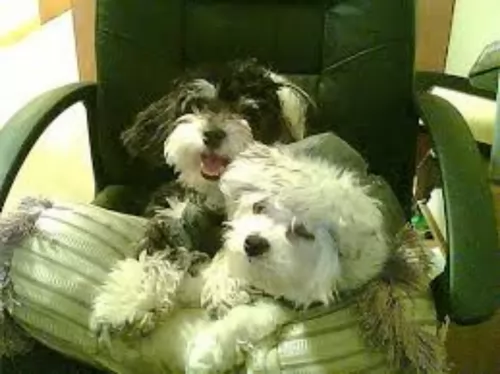 Petzlover
Petzlover Australian Kelpie is originated from Australia but Maltipoo is originated from United States. Australian Kelpie may grow 16 cm / 7 inches higher than Maltipoo. Australian Kelpie may weigh 14 kg / 31 pounds more than Maltipoo. Both Australian Kelpie and Maltipoo has same life span. Both Australian Kelpie and Maltipoo has almost same litter size. Both Australian Kelpie and Maltipoo requires Moderate Maintenance.
Australian Kelpie is originated from Australia but Maltipoo is originated from United States. Australian Kelpie may grow 16 cm / 7 inches higher than Maltipoo. Australian Kelpie may weigh 14 kg / 31 pounds more than Maltipoo. Both Australian Kelpie and Maltipoo has same life span. Both Australian Kelpie and Maltipoo has almost same litter size. Both Australian Kelpie and Maltipoo requires Moderate Maintenance.
 The energetic Kelpie came into being around 1870, with this working dog breed having a role to play with the herding of sheep in the harsh Australian outback.The sheep and wool industry in Australia has always been big business, and Australian ranchers were looking for a tough dog that could cope with sheep but also cope with the harsh environment.
The energetic Kelpie came into being around 1870, with this working dog breed having a role to play with the herding of sheep in the harsh Australian outback.The sheep and wool industry in Australia has always been big business, and Australian ranchers were looking for a tough dog that could cope with sheep but also cope with the harsh environment.
These are adaptable dogs too and their ancestors include the Coley or Collie, a British herding-type dog, the English- and the Australian Shepherd and the Dingo. In fact it is believed that up to 4% of their genes comes from the Dingo. These adaptable dogs were also brought to North America where they quickly adapted to the different climate and different livestock.
The Australian Kelpie isn’t your regular pet as they are essentially an outdoor, working dog. They are recognized today by the United Kennel Club and registered by the North American Australian Kelpie Registry.
 The Maltipoo is a popular dog breed – a cross between the Maltese and Poodle. The dog originates in the United States.
The Maltipoo is a popular dog breed – a cross between the Maltese and Poodle. The dog originates in the United States.
The Maltipoo is a cross breed but it is often referred to as a designer dog because of it being purposely bred. The cute little dog has been created to be a companion dog, suiting allergy sufferers because of him being a low shedder and considered hypoallergenic.
The Maltipoo isn’t officially recognized as a true breed. Some Maltipoo Clubs and Registries have been formed.
 The Kelpie is a medium-sized dog with a coat that comes in a number of colours – black, chocolate, fawn, red, blue, tan, white and gold. . The nose colour blends in with the dog’s coat colour and can be black, brownish and even pinkish.
The Kelpie is a medium-sized dog with a coat that comes in a number of colours – black, chocolate, fawn, red, blue, tan, white and gold. . The nose colour blends in with the dog’s coat colour and can be black, brownish and even pinkish.
The Kelpie has a medium-length tail which is low-set. The ears are pricked, giving the dog an intelligent, alert appearance. The dog’s head is also narrow and long, and his eyes are bright and inquisitive.
The Australian Kelpie has an athletic appearance, with a body which is longer than their height, similar to that of a German Shepherd. Because the Australian Kelpie is such an energetic, active breed, he’ll need plenty of ‘jobs to do’, lots of ball games and other exercise to keep him free from boredom and to ensure he maintains his lithe, lean, muscular limbs.
 The small Maltipoo stands at between 20 and 35cm and weighs about 2 to 6kg. There is no breed standard for this dog. The coat is fluffy and is more inclined to be wavy than curly. It can become quite long and most people prefer to have him professionally clipped.
The small Maltipoo stands at between 20 and 35cm and weighs about 2 to 6kg. There is no breed standard for this dog. The coat is fluffy and is more inclined to be wavy than curly. It can become quite long and most people prefer to have him professionally clipped.
Coat colors vary from white to cream, apricot and brown or it can be a combination of these colors. He has a tail which some people prefer to dock, but if not, the tail is long and curls, sometimes over the back.
Owning a Maltipoo, you’ll quickly discover that this little dog is active, feisty, bright and, fun-loving, and your life is pretty much not going to have a dull moment with him in it.
If you’re a first time dog owner you’ll love the Maltipoo as he is pretty much easy going. He makes an excellent family pet as he is even tempered. Make sure your kids have been taught how to treat him – with respect, gentleness and kindness. Never allow toddlers to climb over any dog – big or small.
The Maltipoo is intelligent too and this means training and socialization will be easy for him. Many people use them as therapy dogs and they definitely seem to have an affinity with older people, bringing joy into their lives with their bright nature.
They are dogs that can adapt to life in the city or the countryside, just so long as they are with their beloved human family. They’re essentially indoor dogs but will gladly venture outdoors if it means ball games on the lawn with the children or a walk outside the confines of his home. This gives him the opportunity to smell new aromas, a physically and mentally stimulating game for him.
 The Australian Kelpie is an active, busy, intelligent, loving breed who is highly protective of his human family. He gets on well with children and other pets in the home but you’ll want him trained if you want him to be gentle around children and smaller pets. He does tend to gravitate towards one particular family member as his ‘favourite’ though.
The Australian Kelpie is an active, busy, intelligent, loving breed who is highly protective of his human family. He gets on well with children and other pets in the home but you’ll want him trained if you want him to be gentle around children and smaller pets. He does tend to gravitate towards one particular family member as his ‘favourite’ though.
Your Kelpie won't do well in an apartment as he is a working dog who wants plenty of place to run and play. If he is bored, it manifests itself with constant barking. Make sure to provide a stimulating, active lifestyle for your Australian Kelpie, provide him with everything a dog needs and you’ll be rewarded with a devoted and loyal companion.
 Your Maltipoo is guaranteed to bring much joy into your home. He is a social dog, loving to spend time with his human family, whether indoors our outdoors. He is an active dog so will look forward to his walk every day.
Your Maltipoo is guaranteed to bring much joy into your home. He is a social dog, loving to spend time with his human family, whether indoors our outdoors. He is an active dog so will look forward to his walk every day.
Treat your little pet with love and good care, after all he has got so much companionship to offer and deserves the best there is to that the 12 to 15 years he has are filled with health and happiness.
 Your Australian Kelpie is a hardy breed and you won’t find many health problems with him. Yes, every dog is susceptible to illnesses which are common with all dog breeds, and these are illnesses such as hip dysplasia and cryptorchidism.
Your Australian Kelpie is a hardy breed and you won’t find many health problems with him. Yes, every dog is susceptible to illnesses which are common with all dog breeds, and these are illnesses such as hip dysplasia and cryptorchidism.
You will need to check your Kelpie out for eye disease such as PRA or Progressive Retinal Atrophy, a group of genetic diseases which are found in some breeds of dogs. This can lead to cataracts and blindness.
Health problems in your Australian Kelpie can certainly be partially prevented by the way you feed your dog and by the environment you provide him with. Every dog has the potential to develop genetic health problems, but as we’ve said, the Kelpie is a generally healthy breed.
Always find a reputable breeder whose focus is on breeding healthy dogs and who can provide certification that the parents of the dog are clear of defects and are in tip-top condition for breeding.
Along with quality food and fresh water, getting your puppy vaccinated is hugely important. Australian Kelpie puppy shots will protect your new 4-legged family member from the likes of distemper, parvovirus and hepatitis. Your puppy will also need additional booster vaccinations after his first shots which start at around 8 weeks of age.
 The Maltipoo is such a bright little dog, brimming with energy, but even so, he can get sick, just like with any other dog.
The Maltipoo is such a bright little dog, brimming with energy, but even so, he can get sick, just like with any other dog.
Small dogs are prone to dental problems and gum disease and tartar build up can cause many problems and tooth loss. Any dental infections can lead to infections which can put the entire body in jeopardy.
This is a degenerative eye disorder that can cause blindness and although there is no cure there are things that the vet can do for your pet.
 Australian Kelpies are low maintenance and their coat is easy to groom and maintain. You want to give him a good brush twice a week to get rid of loose hair. Australian Kelpies are moderate shedders.
Australian Kelpies are low maintenance and their coat is easy to groom and maintain. You want to give him a good brush twice a week to get rid of loose hair. Australian Kelpies are moderate shedders.
It is important to get your puppy off on the right foot to avoid health problems later on. Homemade dog food which includes chicken, rice and vegetables is always the best food for your dog. If you can't prepared your own meals for your Kelpie, top grade commercial dog food brands are recommended.
When looking at dog foods, remember that your Kelpie is a working dog – a naturally active breed and you’ll need to look at dog food which has been specially formulated for active dogs. Every dog will need raw meat in their diet if you want to avoid a dog with an itchy, flaky skin, a dog with poor energy levels and a dog that has no resistance to infection.
Every owner who cares for their dog will provide him with socialization and training. The Australian Kelpie is an intelligent breed who responds well to training.
 The Maltipoo is such a sweet little dog – you want to be sure that you look after him as well as can be.
The Maltipoo is such a sweet little dog – you want to be sure that you look after him as well as can be.
Always take your pet for regular veterinary check-ups if you suspect he is ill. If you get a Maltipoo puppy you will need to take him to the vet because there are a number of vaccines he will need to prevent him from picking up some life threatening canine diseases. Some of these are parvo and rabies among others.
Also, as your Maltipoo reaches adulthood you will need to decide whether you will have the dog spayed or neutered to prevent puppies.
Groom your Maltipoo to keep the coat in tip top condition. Brush him at least twice a week to keep him free of loose hairs. It’s a nice bonding session for your pet too and it gives you the chance to check for fleas and ticks. Most Maltipoo owners take their pets to professional groomers to have the coat trimmed as then he looks and feels more comfortable in warmer weather.
Be careful about bathing him too often as even the mildest shampoos can irritate his skin and it strips the coat of natural oils. Other grooming needs will require you keeping his nails short and cleaning his teeth at least 2 or 3 times a week. Because he has floppy ears, check inside them as they can collect excess wax and debris.
If you are unsure about these kinds of grooming needs, check with your vet or groomer because doing it wrong could cause injury to your pet.
Give your pet a soft, warm, dry bed to sleep in. You can make a soft ‘nest’ on the floor or you can buy a sleeping platform or traditional dog basket.
With a Maltipoo, choose a high-quality small breed dog food if you are going to feed him commercially manufactured food. This is to ensure he remains healthy. Try and keep your diet simple for your Maltipoo to avoid stomach problems.
For variety, add in some chopped boiled chicken, brown rice and vegetables to his dry kibble. The amount of food you give him will depend on his size and activity levels but you want to avoid feeding him too much so that it leads to obesity. Obesity can bring on a host of dog illnesses.
As opposed to one larger bowl of food, rather feed him two smaller meals which is far healthier for him. Remember to always have a bowl of fresh, cool water standing close by.